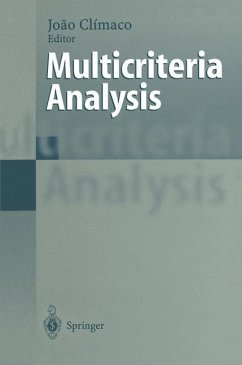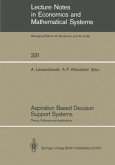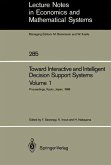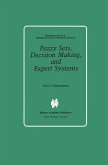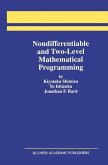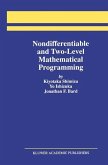Multicriteria Analysis
Proceedings of the XIth International Conference on MCDM, 1¿6 August 1994, Coimbra, Portugal
Herausgegeben:Clímaco, João
Multicriteria Analysis
Proceedings of the XIth International Conference on MCDM, 1¿6 August 1994, Coimbra, Portugal
Herausgegeben:Clímaco, João
- Broschiertes Buch
- Merkliste
- Auf die Merkliste
- Bewerten Bewerten
- Teilen
- Produkt teilen
- Produkterinnerung
- Produkterinnerung
J. CIimaco and C. H. Antunes After the pleasure which has been to host the community of researchers and practitioners in the area of multicriteria analysis (MA) in Coimbra in August 1994, this volume of proceedings based on the papers presented at the conference is the last step of that venture. Even though this may not be the appropriate place we cannot resist, however, the temptation to express herein some brief feelings about the conference. Almost everything concerning the conference organisation has been "handcrafted" by a small number of people, with the advantages and disadvantages that…mehr
Andere Kunden interessierten sich auch für
![Aspiration Based Decision Support Systems Aspiration Based Decision Support Systems]() Aspiration Based Decision Support Systems41,99 €
Aspiration Based Decision Support Systems41,99 €![Toward Interactive and Intelligent Decision Support Systems Toward Interactive and Intelligent Decision Support Systems]() Toward Interactive and Intelligent Decision Support Systems81,99 €
Toward Interactive and Intelligent Decision Support Systems81,99 €![Fuzzy Sets, Decision Making, and Expert Systems Fuzzy Sets, Decision Making, and Expert Systems]() Heintz-Jürgen ZimmermannFuzzy Sets, Decision Making, and Expert Systems121,99 €
Heintz-Jürgen ZimmermannFuzzy Sets, Decision Making, and Expert Systems121,99 €![Dynamical Aspects in Fuzzy Decision Making Dynamical Aspects in Fuzzy Decision Making]() Dynamical Aspects in Fuzzy Decision Making75,99 €
Dynamical Aspects in Fuzzy Decision Making75,99 €![Dynamical Aspects in Fuzzy Decision Making Dynamical Aspects in Fuzzy Decision Making]() Yuji Yoshida (ed.)Dynamical Aspects in Fuzzy Decision Making106,99 €
Yuji Yoshida (ed.)Dynamical Aspects in Fuzzy Decision Making106,99 €![Nondifferentiable and Two-Level Mathematical Programming Nondifferentiable and Two-Level Mathematical Programming]() Kiyotaka ShimizuNondifferentiable and Two-Level Mathematical Programming121,99 €
Kiyotaka ShimizuNondifferentiable and Two-Level Mathematical Programming121,99 €![Nondifferentiable and Two-Level Mathematical Programming Nondifferentiable and Two-Level Mathematical Programming]() Kiyotaka ShimizuNondifferentiable and Two-Level Mathematical Programming112,99 €
Kiyotaka ShimizuNondifferentiable and Two-Level Mathematical Programming112,99 €-
-
-
J. CIimaco and C. H. Antunes After the pleasure which has been to host the community of researchers and practitioners in the area of multicriteria analysis (MA) in Coimbra in August 1994, this volume of proceedings based on the papers presented at the conference is the last step of that venture. Even though this may not be the appropriate place we cannot resist, however, the temptation to express herein some brief feelings about the conference. Almost everything concerning the conference organisation has been "handcrafted" by a small number of people, with the advantages and disadvantages that this approach generates. Our first word of acknowledgement is of course due to those who have had a permanent and active role in the multiple aspects which make the success of a conference: Maria Joao Alves, Carlos Henggeler Antunes (who is a co author of this introduction since he has closely collaborated with me in the scientific programme), Joao Paulo Costa, Luis Dias (who greatly contributed to the organisation of this volume) and Paulo Melo, as well as Leonor Dias, from the Faculty of Economics, who has shown an outstanding dedication. To those who collaborated with the organisers in the framework of their professional activity, special thanks due to Adelina whose dedication greatly exceeded her duties. As you probably know from your own experience every small detail of the conference organisation required a lot of "sweating", but the atmosphere of joy and friendship then generated has been a generous "pay-off".
Produktdetails
- Produktdetails
- Verlag: Springer / Springer Berlin Heidelberg / Springer, Berlin
- Artikelnr. des Verlages: 978-3-642-64500-6
- Softcover reprint of the original 1st ed. 1997
- Seitenzahl: 632
- Erscheinungstermin: 5. Dezember 2011
- Englisch
- Abmessung: 235mm x 155mm x 34mm
- Gewicht: 942g
- ISBN-13: 9783642645006
- ISBN-10: 3642645003
- Artikelnr.: 36120167
- Herstellerkennzeichnung Die Herstellerinformationen sind derzeit nicht verfügbar.
- Verlag: Springer / Springer Berlin Heidelberg / Springer, Berlin
- Artikelnr. des Verlages: 978-3-642-64500-6
- Softcover reprint of the original 1st ed. 1997
- Seitenzahl: 632
- Erscheinungstermin: 5. Dezember 2011
- Englisch
- Abmessung: 235mm x 155mm x 34mm
- Gewicht: 942g
- ISBN-13: 9783642645006
- ISBN-10: 3642645003
- Artikelnr.: 36120167
- Herstellerkennzeichnung Die Herstellerinformationen sind derzeit nicht verfügbar.
General Introduction.- I Theory and Methodology.- Complexity Issues and New Trends in Multiple Criteria Decision Aid.- A Theoretical Framework for Measuring Attractiveness by a Categorical Based Evaluation Technique (MACBETH).- Interdependecne in Multiple Criteria Decision Making.- Extended Preference Structures in Multi Criteria Decision Aid.- Multiple Criteria Decision Making Within Checkland's Soft Systems Methodology.- Validation Aspects of a Prototype Solution Implementation to Solve a Complex MC Problem.- II Aggregating Preferences: Outranking and Utility Function Approaches.- Aggregating Preference: Utility Function and Outranking Approaches.- A Concordance-Discordance Approach to Multi-Criteria Ranking of Actions with Fuzzy Evaluations.- A Multiplicative Method for Synthesizing Preference Ratings.- Some Fundamental Problems in the Selection and Justification of Discrete Alternative MCDM Methods.- The SOLVER of Volvox Multicriterion Table.- III Multiobjective Mathematical Programming.- Multi-objective Mathematical Programming.- On the Development and Future Aspects of Vector Optimization and MCDM - A Tutorial.- Generating Interior Search Directions in Multiple Objective Linear Programming Problems Using Aspiration Levels.- Preemptive Reference Point Method.- Some Optimality Conditions in Multiobjective Programming.- Some Remarks on Trade-off Analysis in Multi-objective Programming.- Eight Concepts of Optimality.- IV Uncertainty in Multiobjective Programming.- Interactive Fuzzy Multiobjective Programming.- A Fuzzy Potential Solution Approach to Multi-Criteria and Multi-Constraint Level Linear Programming Problems.- Distributional Unanimity in Multiobjective Stochastic Linear Programming.- A Fuzzy Decomposition Method by Right-Hand-Side Allocation forLarge-Scale Multiobjective Nonlinear Programming Problems.- V Multiobjective Integer Programming.- Multicriteria Integer Programming: An Overview of the Different Algorithmic Approaches.- MOIP: A DSS for Multiple Objective Integer Programming Problems.- Solving Multi-Objective Knapsack Problem by a Branch-and-Bound Procedure.- Bicriteria Scheduling: Minimizing Flowtime and Maximum Earliness on a Single Machine.- VI Multicriteria Interactive Methods.- Interactive Multiple Criteria Procedures: Some Reflections.- A Method for Solving Multiple Objective Linear Programming Problems.- Interactive Method NIMBUS for Nondifferentiable Multiobjective Optimization Problems.- The LBS-Discrete Interactive Procedure for Multiple-Criteria Analysis of Decision Problems.- VII Group Decision and Negotiation.- Support for Group Decisions and Negotiations - An Overview.- N-Person Cooperative Games with Multiple Scenarios.- Successive Proposals: An Approach to the Computation and Enforcement of Efficient Aggreements.- Opposition and Inefficiency in Negotiated Compromises.- VIII New Computer Science Developments and Multicriteria.- Against Fashion: A Travel Survival Kit in 'Modern' MCDA.- A Flexible Interface for Decision-Aid in Multicriteria Decision Problems.- Decision Support for MCDM That Is Neural Network-Based and Can Learn.- IX Behavioral Research and Multicriteria Analysis.- Behavioral Issues in MCDM: Neglected Research Questions.- X Multicriteria Approaches in Practice - Applications and Methodological Issues.- Foreword.- An Experimental Comparison of MOLP Interactive Approaches Based on a Regional Planning Model.- A Multiple Criteria Approach to the Estimation of Environmental Quality.- Application of MCDA to Corporate Loan Requests Evaluation.- DSS: They do Work!.-OpTIX-II: A Software Environment for MCDM Based on Distributed and Parallel Computing.- Testing a Bicriterion Location-Allocation Model with Real-World Network Traffic: The Case of Edmonton, Canada.- On the Use of Multicriteria Decision Aid Methods to Portfolio Selection.- Interfirm Performance Evaluation Under Uncertainty: A Multi-dimensional Framework.- Scenario Analysis and Multicriteria Decision Making.- A Multicriteria Approach for Evaluating Efficiency and Appropriateness of Industries: A Case in China.- Valuation of Environmental Goods with Expert Panels.- A Case Study in Military Decision-Making with Mission-Oriented Multiple Objectives.- XI Future Trends on Multicriteria Analysis.- Thoughts on the Future of the Multicriteria Field: Basic Convictions and Outline for a General Methodology.- MCDM Trends in Natural Resources and Environmental Management.- Research Agenda in MCDM.- MCDM at the Crossroads.- Non-Fully Resolved Questions about the Efficient/Nondominated Set.- Future Trends in MCDM.- Towards the Tradeoffs-Free Optimality in MCDM.- Some Thoughts on MCDM: Myths and Ideas.- The European School of MCDA: Some Recent Trends.- Congress Organization.
General Introduction.- I Theory and Methodology.- Complexity Issues and New Trends in Multiple Criteria Decision Aid.- A Theoretical Framework for Measuring Attractiveness by a Categorical Based Evaluation Technique (MACBETH).- Interdependecne in Multiple Criteria Decision Making.- Extended Preference Structures in Multi Criteria Decision Aid.- Multiple Criteria Decision Making Within Checkland's Soft Systems Methodology.- Validation Aspects of a Prototype Solution Implementation to Solve a Complex MC Problem.- II Aggregating Preferences: Outranking and Utility Function Approaches.- Aggregating Preference: Utility Function and Outranking Approaches.- A Concordance-Discordance Approach to Multi-Criteria Ranking of Actions with Fuzzy Evaluations.- A Multiplicative Method for Synthesizing Preference Ratings.- Some Fundamental Problems in the Selection and Justification of Discrete Alternative MCDM Methods.- The SOLVER of Volvox Multicriterion Table.- III Multiobjective Mathematical Programming.- Multi-objective Mathematical Programming.- On the Development and Future Aspects of Vector Optimization and MCDM - A Tutorial.- Generating Interior Search Directions in Multiple Objective Linear Programming Problems Using Aspiration Levels.- Preemptive Reference Point Method.- Some Optimality Conditions in Multiobjective Programming.- Some Remarks on Trade-off Analysis in Multi-objective Programming.- Eight Concepts of Optimality.- IV Uncertainty in Multiobjective Programming.- Interactive Fuzzy Multiobjective Programming.- A Fuzzy Potential Solution Approach to Multi-Criteria and Multi-Constraint Level Linear Programming Problems.- Distributional Unanimity in Multiobjective Stochastic Linear Programming.- A Fuzzy Decomposition Method by Right-Hand-Side Allocation forLarge-Scale Multiobjective Nonlinear Programming Problems.- V Multiobjective Integer Programming.- Multicriteria Integer Programming: An Overview of the Different Algorithmic Approaches.- MOIP: A DSS for Multiple Objective Integer Programming Problems.- Solving Multi-Objective Knapsack Problem by a Branch-and-Bound Procedure.- Bicriteria Scheduling: Minimizing Flowtime and Maximum Earliness on a Single Machine.- VI Multicriteria Interactive Methods.- Interactive Multiple Criteria Procedures: Some Reflections.- A Method for Solving Multiple Objective Linear Programming Problems.- Interactive Method NIMBUS for Nondifferentiable Multiobjective Optimization Problems.- The LBS-Discrete Interactive Procedure for Multiple-Criteria Analysis of Decision Problems.- VII Group Decision and Negotiation.- Support for Group Decisions and Negotiations - An Overview.- N-Person Cooperative Games with Multiple Scenarios.- Successive Proposals: An Approach to the Computation and Enforcement of Efficient Aggreements.- Opposition and Inefficiency in Negotiated Compromises.- VIII New Computer Science Developments and Multicriteria.- Against Fashion: A Travel Survival Kit in 'Modern' MCDA.- A Flexible Interface for Decision-Aid in Multicriteria Decision Problems.- Decision Support for MCDM That Is Neural Network-Based and Can Learn.- IX Behavioral Research and Multicriteria Analysis.- Behavioral Issues in MCDM: Neglected Research Questions.- X Multicriteria Approaches in Practice - Applications and Methodological Issues.- Foreword.- An Experimental Comparison of MOLP Interactive Approaches Based on a Regional Planning Model.- A Multiple Criteria Approach to the Estimation of Environmental Quality.- Application of MCDA to Corporate Loan Requests Evaluation.- DSS: They do Work!.-OpTIX-II: A Software Environment for MCDM Based on Distributed and Parallel Computing.- Testing a Bicriterion Location-Allocation Model with Real-World Network Traffic: The Case of Edmonton, Canada.- On the Use of Multicriteria Decision Aid Methods to Portfolio Selection.- Interfirm Performance Evaluation Under Uncertainty: A Multi-dimensional Framework.- Scenario Analysis and Multicriteria Decision Making.- A Multicriteria Approach for Evaluating Efficiency and Appropriateness of Industries: A Case in China.- Valuation of Environmental Goods with Expert Panels.- A Case Study in Military Decision-Making with Mission-Oriented Multiple Objectives.- XI Future Trends on Multicriteria Analysis.- Thoughts on the Future of the Multicriteria Field: Basic Convictions and Outline for a General Methodology.- MCDM Trends in Natural Resources and Environmental Management.- Research Agenda in MCDM.- MCDM at the Crossroads.- Non-Fully Resolved Questions about the Efficient/Nondominated Set.- Future Trends in MCDM.- Towards the Tradeoffs-Free Optimality in MCDM.- Some Thoughts on MCDM: Myths and Ideas.- The European School of MCDA: Some Recent Trends.- Congress Organization.

